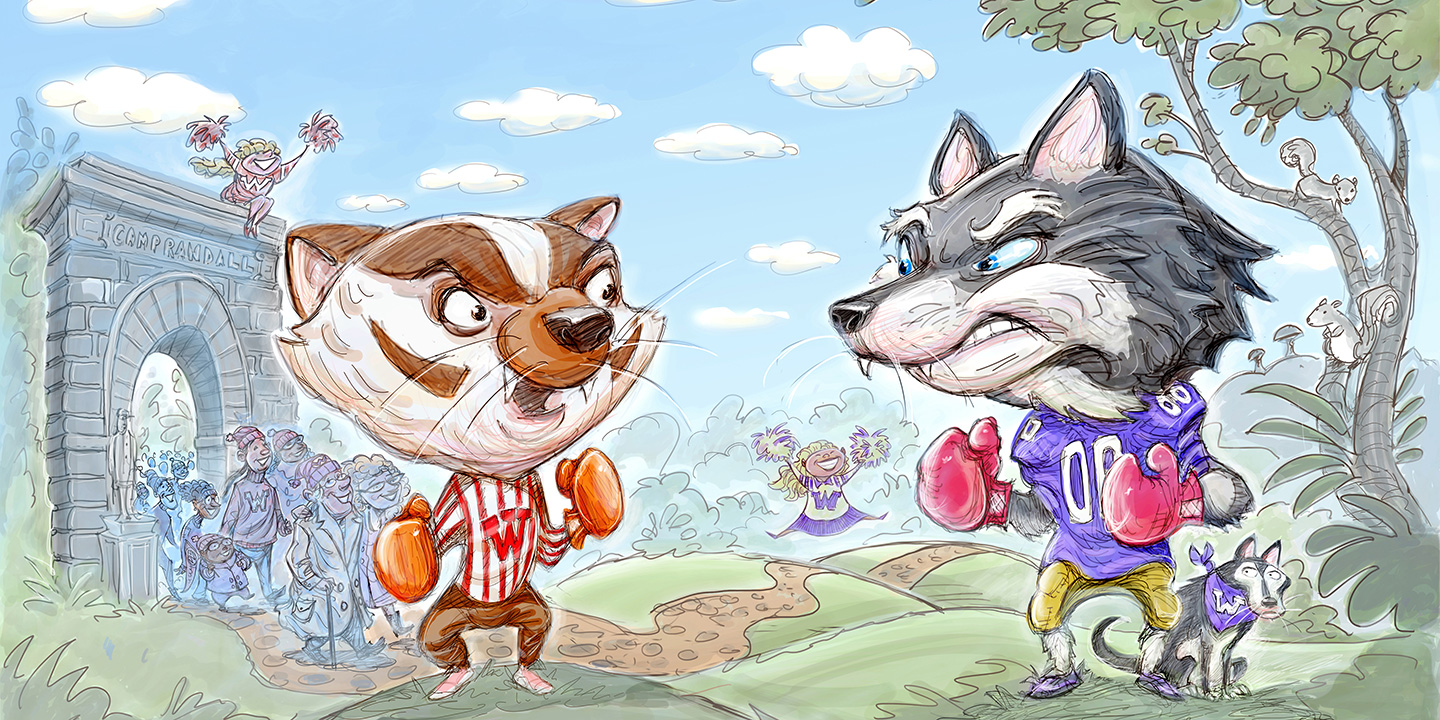
Double UWs
Can the Big Ten handle two universities with the same handle?
Not long after my wife and I moved to the Pacific Northwest in 2020, I overheard someone say “UW” and quickly realized they meant the University of Washington. Seriously. They acted like it was the only UW in the country!
Now it’s the fall of 2024, and the Big Ten just got bigger. Seattle’s UW has joined Madison’s UW in the conference. So whenever our Badgers face their Huskies, it’ll be a double UW matchup. What does that mean for the future of our favorite initials?
To find out, I launched an investigation into this touchy question: which is the legitimate UW?
Ask the Engineers
Dalton Brockett is a smart guy. Graduated valedictorian from high school. Double majoring in electrical and computer engineering at UW–Seattle. Did an internship with Boeing.
“Dalton,” I ask him, “can the Big Ten handle two UWs?”
“Yes, they can,” he says, quickly identifying key variables. “It’s good for our students because it’ll mean more money, but it won’t be good for athletes because they’ll have to travel farther to compete.”
Nice analysis, Dalton.
“What about the impact on athletic competition?”
“It’ll be confusing at first. How will they handle scoreboards and broadcasting during games? If they meet in the playoffs, it could turn into a real rivalry.”
What’s a Wisconsin engineer’s take? Bruce Case ’77, MS’83 managed UW–Madison’s robotics lab. Not an athlete, but he did hardware development in sports medicine. Bruce is a smart guy, too.
“It’s unfair to expect student-athletes to travel so far to compete,” he replies. “The Big Ten should go to 20 schools with two conferences.”
“What about the issue of two UWs?” I ask.
“Washington should change its name. In a fair fight, a Badger will always beat a Husky.”
Who knew engineers were so feisty?
When a Badger Meets a Husky
The Big Ten is, in practice, the Big 18 now. That’s weird. But each team only plays nine others during the regular season, and there’s no double-UW game at Camp Randall or Husky Stadium this year. So, if you’re itching for a Badger–Husky matchup, maybe swing by a cross-country meet.
Whenever the Badgers and Huskies do cross paths, people already have opinions about the outcome. “Their mascot is a house pet,” says Sarah Schutt, executive director of the Wisconsin Alumni Association (WAA). “Ours is a ferocious feral animal.”
When it comes to Big Ten Badgers battling Huskies, UW–Madison student Brielle Wallace x’25, a management and human resources major, sees only red. (Washington colors: purple and gold.)
“We became the first-ever Big Ten champions back in 1896 [in football],” Wallace says. “It’s pretty clear that W stands for winners. So the University of Washington better be ready!”
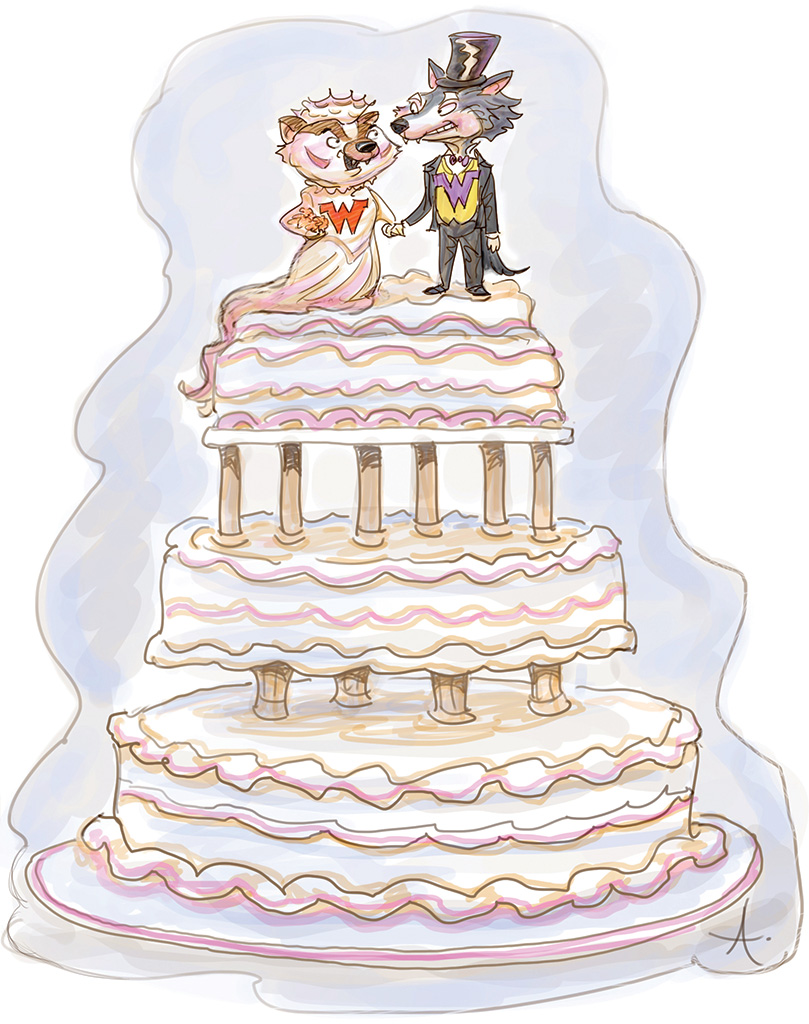
Speaking of Alumni
Schutt, whose parents are Washington natives, was quick to mention that her Washington counterpart, Paul Rucker, is married to a Badger, Noy Saetia-Rucker ’93. Ooh, this should be fun. He’s all Husky. Two degrees from UW–Seattle. Been working there 20 years. And now he’s vice president for alumni engagement. While Rucker looks forward to playing football in the snow at Camp Randall, he argues for the superiority of Husky Stadium, which is on the shores of Union Bay.
“Washington is the greatest setting in college football — the only one with water access,” he said, conveniently forgetting about Madison’s lakes.
So how do we settle this issue of Badger–Husky bragging rights? Let’s ask an athlete: Kyle Luttinen, a 2023 UW–Seattle finance graduate who spent three years on the Husky basketball team.
“It’s simple,” Luttinen says. “Whoever wins the championship in football or basketball any given year gets rights to UW that year.” Okay.
What If We Go by the Numbers?
Maybe we don’t have to wait for this year’s competition to see which is the legitimate UW. We can check some key numbers (Badgers red, Huskies purple):
| Badgers | Huskies | |
|---|---|---|
| 2022–23 Athletics Budget | $167M | $150M |
| NCAA Division 1 Sports Teams | 23 | 20 |
| Stadium Seating | 80,321 | 70,138 |
| Football Conference Titles | 14 | 18 |
| Football National Titles | 0 | 2 |
| Rose Bowl Appearances | 10 | 15 |
| Rose Bowl Wins | 3 | 7 |
| Men’s Basketball National Titles | 1 (1941) | 0 |
| Men’s Basketball Conference Titles | 20 | 12 |
| Men’s Basketball Final Four Appearances | 4 | 1 (1953) |
| Women’s Basketball National Titles | 0 | 1 |
| Women’s Basketball Conference Titles | 0 | 5 |
| Softball National Titles | 0 | 0 |
| Softball Conference Titles | 0 | 4 |
| Volleyball National Titles | 1 | 1 |
| Volleyball Conference Titles | 9 | 7 |
Definitive? Not really. Especially when you look behind the numbers. Washington has no NCAA hockey teams. But in 1960, its football team beat Wisconsin 44–8 in the Rose Bowl. That hurts. And … this is hard to type … Wisconsin has no NCAA baseball team.
Graciously, UW–Seattle catcher Colton Bower doesn’t mention this fact. “To be fair,” he says, “we are the ones joining the Big Ten.” Thanks, Colton. And I’ll ignore the fact that when I first contacted you, you weren’t sure who the other UW could even be.
When ranking the UWs, Kelcy McKenna, head coach for UW–Madison women’s tennis, has an idea. “Being a Badger from the Pacific Northwest,” she says, “it’s infuriating to me that what comes up first on a UW Google search is always Washington. So if there is any way somebody could drop some dollars to Google to get us to number one, I think that is our first step.”
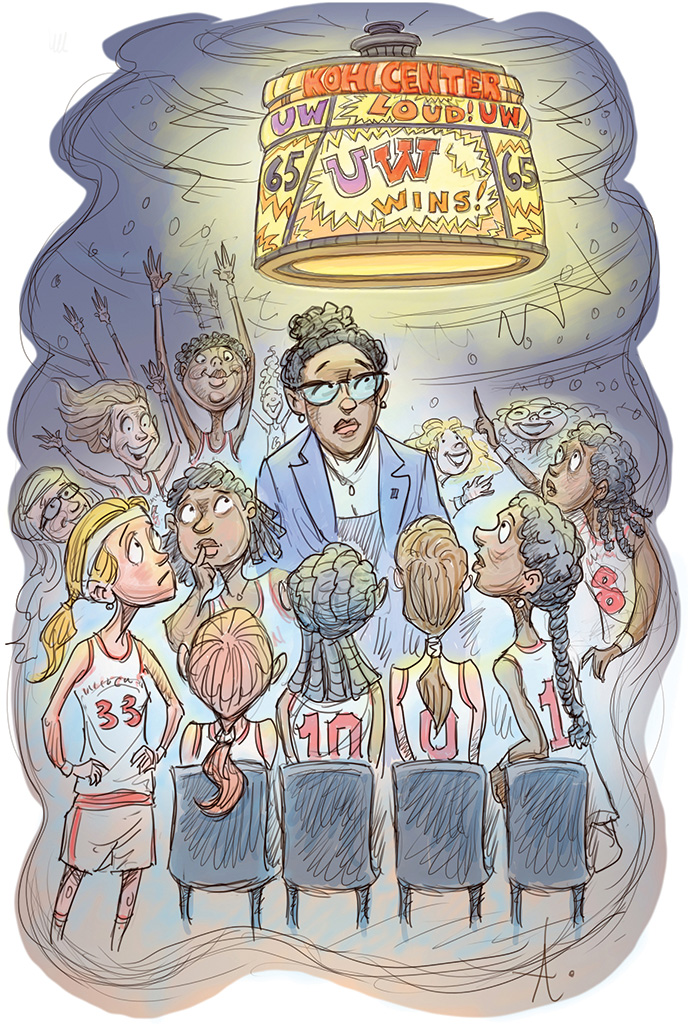
Can We Be Serious for a Moment?
When the Big Ten announced Washington’s move to the conference, UW–Madison chancellor Jennifer L. Mnookin tweeted “a warm Wisconsin welcome to old friends and new colleagues in … Seattle.” When I contact UW–Seattle’s president, Ana Mari Cauce, she reciprocates. “We’re looking forward to visiting the members of our new conference,” she says, “and especially thrilled to welcome them to Seattle.” Both leaders were quick to expand the conversation.
“I look forward to the … Huskies … joining our @BigTenAcademic [Alliance] as well,” Mnookin tweeted. In an email, Cauce said she is “excited to be in a conference with so many academic and research powerhouses, including Wisconsin. … While we will compete hard on the field, we will do a lot more collaborating off the field.”
This broader perspective turned up often during my investigation. WAA’s Schutt cited the level of research being done at both schools. UW–Seattle’s Rucker spoke of the two UWs’ investments in and commitment to the public good. So I asked him what all this ultimately means for the Big Ten.
He paused for just a moment, then flashed a smile. “Here’s what it means,” he said. “The UW always wins!” •
Jac La Tour ’78 and his wife, Jackie, are happily retired in Poulsbo, Washington, a Norwegian village on the shore of Puget Sound that reminds them of Mount Horeb, Wisconsin, where Jac got his first journalism job.
Published in the Fall 2024 issue
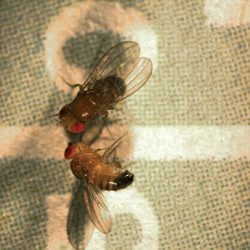
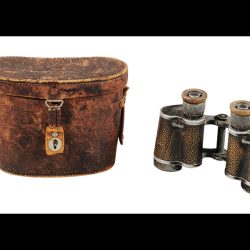

Comments
John A YEAGER September 27, 2024
On Wisconsin,
I really enjoyed reading Jac La Tour’s “Double UWs” article in the current Fall 2024 issue. I graduated from UW-Madison (Political Science) in 1985, pursued a career in TV news, then moved out here to the Pacific Northwest in 1986. I left the news business in 2005. In 2013, I got my Masters in Digital Media from the other UW (University of Washington). I’m not sure how many double UW graduates there are but I’m proud to be a Badger and a Husky.
Madison prepared me to pursue a career in news. The UW out here prepared me for a communications career in the 21st century in digital media. I owe a lot to both schools.
It’ll be fun to see the Badgers when they come out here for a football game. They tailgate here in boats near Husky Stadium. We call it “sailgating.” Nothing like it back in Madison. I’m not sure who I’ll root for. I can tell you that Jac was right, “The UW always wins.” Thanks for the great story.
John Yeager
Former journalist
University of Wisconsin Political Science (1985)
University of Washington Digital Media (2013)
Diana Brooking October 3, 2024
I am a graduate of the University of Wisconsin. For the past 27 years I have been working for the University of Washington. When I first came to Seattle, I was puzzled by what people meant when they said “U-Dub.” This is how people pronounce “UW” most often here. I never heard the Wisconsin UW pronounced as anything other than “U-double-U.” Maybe just one small way to tell them apart?
Diana Brooking
Librarian, University of Washington
University of Wisconsin MA Library and Information Studies (1991), MA Slavic (1989)
Nancy Schultz-Darken October 8, 2024
I agree with Diana Brooking. They refer to themselves as U-Dub, so when talking it is easy to differentiate. Both universities have a national primate research center and they are differentiated by WaNPRC and WNPRC. So, it would be good to refer the University of Washington as UWa in sports listings in the BIG Ten.
Derek Popp October 8, 2024
I agree that Washington comes up first in internet searches and we should do something about it.